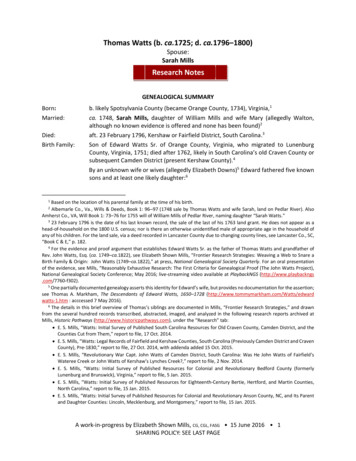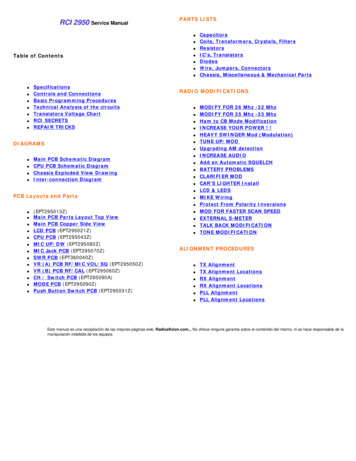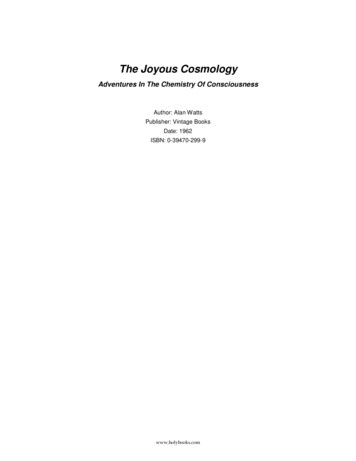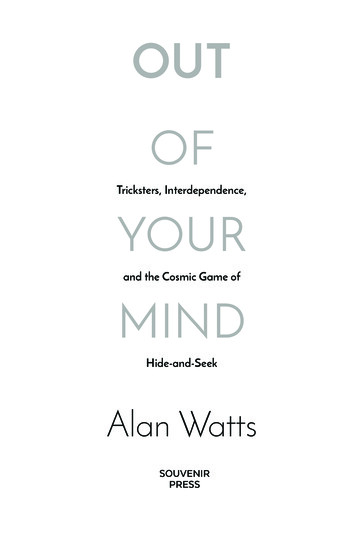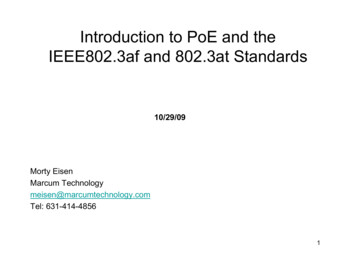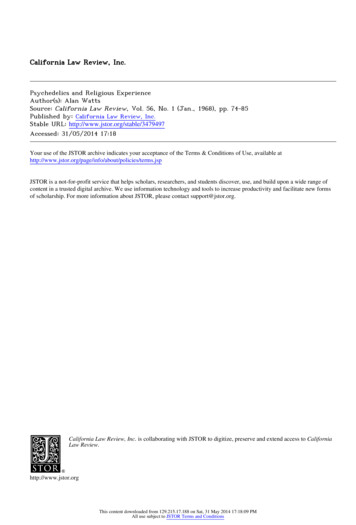
Transcription
California Law Review, Inc.Psychedelics and Religious ExperienceAuthor(s): Alan WattsSource: California Law Review, Vol. 56, No. 1 (Jan., 1968), pp. 74-85Published by: California Law Review, Inc.Stable URL: http://www.jstor.org/stable/3479497 .Accessed: 31/05/2014 17:18Your use of the JSTOR archive indicates your acceptance of the Terms & Conditions of Use, available at ms.jsp.JSTOR is a not-for-profit service that helps scholars, researchers, and students discover, use, and build upon a wide range ofcontent in a trusted digital archive. We use information technology and tools to increase productivity and facilitate new formsof scholarship. For more information about JSTOR, please contact support@jstor.org.California Law Review, Inc. is collaborating with JSTOR to digitize, preserve and extend access to CaliforniaLaw Review.http://www.jstor.orgThis content downloaded from 129.215.17.188 on Sat, 31 May 2014 17:18:09 PMAll use subject to JSTOR Terms and Conditions
Psychedelics andReligiousExperienceAlan Watts*EXPERIENCESresultingfromthe use of psychedelicdrugsare oftenTHEdescribedinterms.are thereforeofinterestto thosereligiousTheylike myselfwho,in the traditionof WilliamJames,xareconcernedwith thepsychologyof religion.For morethan thirty years I have been studyingthe causes,the consequences,and the conditionsof those peculiarstatesconsciousnessin whichthe individualdiscovershimselfto be one continuous processwith God,with the Universe,with the Groundof Being, orwhatevernamehe mayuse by culturalconditioningor personalpreferencefor the ultimateand eternalreality.We have no satisfactoryand definitive namefor experiencesof this kind. The d "cosmicconsciousness"are all too vague andcomprehensiveto denote that specificmode of consciousnesswhich, tothosewho have knownit, is as real and overwhelmingas fallingin love.This Articledescribessuch states of consciousnessas and when inducedfromby psychedelicdrugs,althoughthey are e.The Articlethen discussesobjectionsto theuse of psychedelicdrugswhicharisemainlyfromthe oppositionbetweenmysticalvaluesandthe traditionalreligiousandsecularvaluesof Westernsociety.ITHE PSYCHEDELICEXPERIENCEThe ideaof mysticalexperiencesresultingfromdruguse is not readilyacceptedin Westernsocieties.Westernculturehas, historically,a particular fascinationwith the value and virtue of man as an individual,selfdetermining,responsibleego, controllinghimself and his world by thepowerof consciouseffortandwill.Nothing,then,couldbe morerepugnantto this culturaltraditionthan the notion of spiritualor psychologicalgrowththroughthe use of drugs. A "drugged"person is by definitiondimmedin consciousness,foggedin judgment,and deprivedof will. Butchemicalsare narcoticandnot all psychotropic(consciousness-changing)soporific,as are alcohol,opiates,andbarbiturates.The effectsof whatare* S.T.M., D.D. Philosopher and Author, with special interests in the psychology ofreligion and comparative religion. Former research fellow in Social Relations, HarvardUniversity, and twice recipient of research fellowships from the Bollingen Foundation.Publications include: The Wisdom of Insecurity; Myth & Ritual in Christianity; TheWay of Zen; Nature, Man & Woman;PsychotherapyEast & West; The Joyous Cosmology;Beyond Theology.1 See W. JAMES, THE VARIETIESOFRELIGIOUSEXPEl zNCE(1911),74This content downloaded from 129.215.17.188 on Sat, 31 May 2014 17:18:09 PMAll use subject to JSTOR Terms and Conditions
PSYCHEDELICSAND RELIGIOUSEXPERIENCE75now fromthoseofalcoholas laughterdiffersfromrage or delightfromdepression.Thereisreallyno analogybetweenbeing"high"on LSD and "drunk"on bourbon.True, no one in either state shoulddrive a car, but neithershouldonedrivewhile readinga book,playinga violin,or makinglove. Certaincreative activitiesand states of mind demanda concentrationand devotionwhichare simplyincompatiblewith pilotinga death-dealingenginealonga highway.I myself have experimentedwith five of the principalpsychedelics:LSD-25, mescaline,psilocybin,dimethyl-tryptamine(DMT), and cannabis.I have doneso, as WilliamJamestriednitrousoxide,to see if theycouldhelp me in identifyingwhat mightbe called the "essential"or "active" ingredientsof the mysticalexperience.For almostall the classicalliteratureon mysticismis vague,not onlyin describingthe experience,butalso in showingrationalconnectionsbetweenthe experienceitself and thevarioustraditionalmethodsrecommendedto induceit-fasting, ons,and dances.A traditional masterof Zen or Yoga, when asked why such-and-suchpracticeslead or predisposeone to the mysticalexperience,alwaysresponds,"Thisis theway my teachergaveit to me. This is the way I foundout. If you'reseriouslyinterested,try it for yourself."This answerhardlysatisfiesanand fically-minded,It remindshim of archaicmedicalprescriptionscompoundingfive salamanders,powderedgallowsrope,three boiled bats, a scruple of phosphorus,threepinchesof henbane,and a dollopof dragondungdroppedwhen the moon was in Pisces. Maybe it worked, but what was theessentialingredient?It struckme,therefore,thatif any of thepsychedelicchemicalswouldin fact predisposemy consciousnessto the mystical experience,I coulduse them as instrumentsfor studyingand describingthat experienceasone uses a microscopefor bacteriology,even thoughthe microscopeis ancontrivancewhichmightbe said to "distort""artificial"and "unnatural"the visionof the nakedeye. However,whenI was firstinvitedto test themysticalqualitiesof LSD-25 by Dr. Keith Ditman of the NeuropsychiatricClinicat UCLAMedicalSchool,I was unwillingto believethat anymere chemicalcould induce a genuinemystical experience.At most itmightbringabouta state of spiritualinsightanalogousto swimmingwithwaterwings.Indeed,my first experimentwith LSD-25was not mystical.It was an intenselyinterestingaestheticand intellectualexperiencewhichchallengedmy powersof analysisand carefuldescriptionto the utmost.Somemonthslater,in 1959, I triedLSD-25againwith Drs. SterlingBunnelland MichaelAgron,who werethen associatedwith the Langley-This content downloaded from 129.215.17.188 on Sat, 31 May 2014 17:18:09 PMAll use subject to JSTOR Terms and Conditions
76CALIFORNIALAW REVIEW[Vol.56:74Porter Clinic in San Francisco. In the course of two experiments I wasamazed and somewhat embarrassedto find myself going through states ofconsciousness which correspondedprecisely with every description of major mystical experiencesthat I had ever read.2Furthermore,they exceededboth in depth and in a peculiar quality of unexpectedness the three "natural and spontaneous"experiences of this kind which had happened to mein previous years.Through subsequent experimentation with LSD-25 and the otherchemicals named above (with the exception of DMT, which I find amusing but relatively uninteresting) I found I could move with ease into thestate of "cosmic consciousness," and in due course became less and lessdependent on the chemicals themselves for "tuning-in"to this particularwave-length of experience. Of the five psychedelics tried, I found thatLSD-25 and cannabis suited my purposes best. Of these two, the lattercannabis-which I had to use abroadin countrieswhere it is not outlawed,proved to be the better. It does not induce bizarre alterations of sensoryperception, and medical studies indicate that it may not, save in greatexcess, have the dangerousside effects of LSD, namely chromosomaldamage and possible psychotic episodes.For the purposes of this study, in describing my experiences with psychedelic drugs, I avoid the occasional and incidental bizarre alterationsof sense perception which psychedelic chemicals may induce. I am concerned, rather, with the fundamental alterations of the normal, sociallyinduced consciousness of one's own existence and relation to the externalworld. I am trying to delineate the basic principles of psychedelic awareness. But I must add that I can speak only for myself. The quality ofthese experiences depends considerably upon one's prior orientation andattitude to life, although the now voluminous descriptive literature ofthese experiences accords quite remarkablywith my own.Almost invariably, my experiments with psychedelics have had fourdominant characteristics. I shall try to explain them-in the expectationthat the readerwill say, at least of the second and third, "Why, that's obvious! No one needs a drug to see that." Quite so, but every insight hasdegrees of intensity. There can be obviousi and obvious2--and the lattercomes on with shattering clarity, manifesting its implications in everysphere and dimension of our existence.The first characteristic is a slowing down of time, a concentration inthe present. One's normally compulsive concern for the future decreases,and one becomes aware of the enormous importance and interest of whatis happening at the moment. Other people, going about their business on2 An excellent anthology of such experiences is R. JoHNsoN, WATCHER ON THEHILLS(1959).This content downloaded from 129.215.17.188 on Sat, 31 May 2014 17:18:09 PMAll use subject to JSTOR Terms and Conditions
19681PSYCHEDELICSAND RELIGIOUSEXPERIENCE77the streets,seemto be slightlycrazy,failingto realizethat the wholepointof life is to be fullyawareof it as it happens.Onethereforerelaxes,almostluxuriously,into studyingthe colorsin a glass of water,or in listeningtothe now highly articulatevibrationof every note played on an oboe orsung by voice.Fromthepragmaticstandpointof ourculture,suchan attitudeis verybad for business.It mightlead to improvidence,lack of foresight,diminished sales of insurancepolicies, and abandonedsavings accounts.Yetthisis just the correctivethat our cultureneeds.No one is morefatuouslyimpracticalthan the "successful"executivewho spendshis wholelife absorbedin franticpaperworkwith the objectiveof retiringin comfortatsixty-five,whenit will all be too late. Onlythosewho have cultivatedtheart of livingcompletelyin the presenthave any use for makingplans forthe future,for when the plans maturethey will be able to enjoy the renevercomes."I have neveryet hearda preacherurgingsults. "Tomorrowhis congregationto practicethat section of the Sermonon the Mountwhichbegins,"Be not anxiousfor the morrow. ." The truthis that people who live for the future are, as we say of the insane, "not quite allthere"-or here: by over-eagernessthey areperpetuallymissingthe point.ofatistheprice anxiety,and,whenoverusedit destroysForesight boughtall its own advantages.The secondcharacteristicI will call awarenessof polarity.This is thevivid realizationthat states, things,and events which we ordinarilycalllike backand frontor the poles of a magnet.oppositeare interdependent,seesthat thingswhichare explicitlydifferentareoneawarenessBy polarselfandone:other,subjectand object,left and right,male andimplicityfemale-and then, a little moresurprisingly,solid and space, figureandbackground,pulse and interval,saints and sinners,and police and criminals,ingroupsandoutgroups.Eachis definableonly in termsof the other,and they go togethertransactionally,like buyingand selling,for thereisno sale withouta purchase,and no purchasewithouta sale.As this awarenessbecomesincreasinglyintense,you feel that you yourselfarepolarizedwith the externaluniversein such a way that you implyeach other.Yourpushis its pull, andits pushis yourpull-as whenyou movethe steeringwheelof a car. Are you pushingit or pullingit?At first,this a very odd sensation,not unlikehearingyour ownvoiceplayed back to you on an electronicsystem immediatelyafter you havespoken.Youbecomeconfused,andwait for it to go on! Similarly,you feelthat you are something being done by the universe, yet that the universeis equally something being done by you-which is true, at least in the neurological sense that the peculiar structure of our brains translates thesun into light and air vibrations into sound. Our normal sensation of rela-This content downloaded from 129.215.17.188 on Sat, 31 May 2014 17:18:09 PMAll use subject to JSTOR Terms and Conditions
78CALIFORNIALAW REVIEW[Vol.56:74tionshipto the outsideworldis that sometimesI push it, and sometimesit pushesme. But if the two are actuallyone, wheredoes actionbeginandresponsibilityrest? If the universeis doingme, how can I be sure that,two secondshence,I will still rememberthe Englishlanguage?If I amdoingit, how can I be sure that, two secondshence,my brainwill knowhow to turnthe sun into light? Fromsuch unfamiliarsensationsas thesethe psychedelicexperiencecan generateconfusion,paranoia,and terroreven thoughthe individualis feelinghis relationshipto the worldexactlyas it wouldbe describedby a biologist,ecologist,or physicist,for he isfeelinghimselfas the unifiedfieldof organismand environment.The thirdcharacteristic,arisingfromthe second,is awarenessof relativity.I see that I am a link in an infinitehierarchyof processesand beings, rangingfrommoleculesthroughbacteriaand insects to humanbeings, and,maybe,to angelsand gods-a hierarchyin whicheverylevel isin effect the same situation.For example,the poor man worriesaboutmoney while the rich man worriesabout his health: the worry is thesame, but the differenceis in its substanceor dimension.I realizethatfruitfliesmustthinkof themselvesas people,because,like ourselves,theyfind themselvesin the middle of their own world-with immeasurablygreaterthingsaboveand smallerthingsbelow.To us, they all look alikeand seem to have no personality-as do the Chinesewhen we have notlived amongthem.Yet fruitflies mustsee just as manysubtledistinctionsamongthemselvesas we amongourselves.Fromthis it is but a shortstep to the realizationthat all formsof lifeand beingare simplyvariationson a single theme:we are all in fact onebeingdoingthe samethingin as manydifferentways as possible.As theFrench proverbgoes, plus ga change, plus c'est la meme chose--"the moreit varies,the moreit is one."I see, further,that feelingthreatenedby theinevitabilityof death is really the same experienceas feeling alive, andthat as all beings are feeling this everywhere,they are all just as much"I" as myself.Yet the "I" feeling,to be felt at all, must alwaysbe a sensationrelativeto the "other"-to somethingbeyondits controland experience.To be at all, it mustbeginand end. But the intellectualjumpwhichmysticaland psychedelicexperiencemakehere is in enablingyou to seethat all these myriadI-centersare yourself-not, indeed,your personaland superficiallyconsciousego, but what Hindus call the paramatman,the Self of all selves.3As the retinaenablesus to see countlesspulses of3 Thus Hinduism regardsthe universe,not as an artifact, but as an immensedramainwhich the One Actor (the paramatmanor brahman) plays all the parts, which are his (or"its") masks or personae.The sensationof being only this one particularself, John Doe, isdue to the Actor's total absorptionin playing this and every other part. For fuller exposiTHEHINDUVIEWOFLIFE(1927); H. ZInMMER,PHILOSOPHIEStion, see S. RADHAKRISHNAN,or INDIA 355-463 (1951). A popular version is in A. WATTS,THE BOOK: ON THE TABOOAGAINSTKNOWINGWHOYou ARE (1966).This content downloaded from 129.215.17.188 on Sat, 31 May 2014 17:18:09 PMAll use subject to JSTOR Terms and Conditions
19681PSYCHEDELICSAND RELIGIOUSEXPERIENCE79energy as a single light, so the mystical experience shows us innumerableindividuals as a single Self.The fourth characteristic is awareness of eternal energy, often in theform of intense white light, which seems to be both the current in yournerves and that mysterious e which equals mc2. This may sound likemegalomania or delusion of grandeur-but one sees quite clearly that allexistence is a single energy, and that this energy is one's own being. Ofcourse there is death as well as life, because energy is a pulsation, and justas waves must have both crests and troughs the experience of existingmust go on and off. Basically, therefore, there is simply nothing to worryabout, because you yourself are the eternal energy of the universe playinghide-and-seek (off-and-on) with itself. At root, you are the Godhead, forGod is all that there is. Quoting Isaiah just a little out of context: "I amthe Lord, and there is none else. I form the light and create the darkness:I make peace, and create evil. I, the Lord, do all these things."4This isthe sense of the fundamental tenet of Hinduism, Tat tvam asi---"THAT(i.e., "that subtle Being of which this whole universe is composed") artthou."5Aclassical case of this experience, from the West, is in Tennyson'sMemoirs:A kindof wakingtranceI have frequentlyhad, quiteup fromboyhood,whenI have beenall alone.This has generallycomeuponme thro'repeatingmy own name two or threetimes to myself silently,till all atonce, as it were out of the intensityof the consciousnessof individuality, the individualityitself seemedto dissolveand fade away intoboundlessbeing,and this not a confusedstate, but the clearestof theclearest,the surestof the surest,the weirdestof the weirdest,utterlybeyondwords,wheredeathwas an almostlaughableimpossibility,theloss of personality(if so it were) seemingno extinctionbut the onlytrue life.6Obviously, these characteristics of the psychedelic experience, as Ihave known it, are aspects of a single state of consciousness-for I havebeen describing the same thing from different angles. The descriptions attempt to convey the reality of the experience, but in doing so they alsosuggest some of the inconsistencies between such experience and the current values of society.IIOPPOSITION TO PSYCHEDELIC DRUGSResistenceto allowinguse of psychedelicdrugsoriginatesin both religious and secular values. The difficulty in describing psychedelic experi4 Isaiah 45: 6, 7.5ChandogyaUpanishad6.15.3.Y mIS SoN 320 (1898).i61 AI;RED LORDTENNYsoN,A MEMomThis content downloaded from 129.215.17.188 on Sat, 31 May 2014 17:18:09 PMAll use subject to JSTOR Terms and Conditions
80CALIFORNIALAW REVIEW[Vol. 6:74encesin traditionalreligioustermssuggestsone groundof opposition.TheWesternermust borrowsuchwordsas samadhior mokshafromthe Hindus, or satorior kenshofromthe Japanese,to describethe experienceofonenesswith the universe.We have no logieswill not acceptthe idea that man'sinmostself can be identicalwith the Godhead,even thoughChristiansmay insistthat this was truein the uniqueinstanceof Jesus Christ.Jews and Christians think of God in political and monarchicalterms, as the supremegovernorof the universe,the ultimateboss. Obviously,it is both sociallyunacceptableand logically preposterousfor a particularindividualtoclaim that he, in person,is the omnipotentand omniscientruler of theworld-to be accordedsuitablerecognitionand honor.Suchan imperialand kinglyconceptof the ultimatereality,however,is neithernecessarynor universal.The Hindusand the Chinesehave nodifficultyin conceivingof an identityof the self and the Godhead.Formost Asians,otherthan Muslims,the Godheadmoves and manifeststheworldin muchthe sameway that a centipedemanipulatesa hundredlegs-spontaneously, withoutdeliberationor calculation.In otherwords,theyconceivethe universeby analogywith an organismas distinct from amechanism.They do not see it as an artifactor constructunderthe consciousdirectionof somesupremetechnician,engineer,or architect.If, however,in the contextof Christianor Jewishtraditionan individual declareshimselfto be one with God,he must be dubbedblasphemous (subversive)or insane.Sucha mysticalexperienceis a clear threatto traditionalreligiousconcepts.The Judaeo-Christiantraditionhas amonarchicalimageof God,andmonarchs,who ruleby force,fearnothingThe Churchhas thereforealwaysbeen highlymorethaninsubordination.ofbecausethey seemto be insubordinateand to claimsuspicious mysticsequalityor, worse,identitywith God. For this reasonJohn Scotus ErigenaandMeisterEckhartwerecondemnedas heretics.This was also whythe Quakersfacedoppositionfor theirdoctrineof the InwardLight, andfor theirrefusalto removehats in churchand in court.A few occasionalmysticsmay be all rightso long as they watchtheirlanguage,like St. Teresa of Avila and St. John of the Cross,who maintained,shall we say, ameta-physicaldistanceof respectbetweenthemselvesand their heavenlyKing.Nothing,however,couldbe morealarmingto the ecclesiasticalhierarchythan a popularoutbreakof mysticism,for this mightwell amountto setting up a democracyin the kingdomof heaven-and such alarmwould be shared equally by Catholics, Jews, and fundamentalist Protestants.The Monarchicalimage of God with its implicit distaste for religiousinsubordinationhas a more pervasive impact than many Christians mightThis content downloaded from 129.215.17.188 on Sat, 31 May 2014 17:18:09 PMAll use subject to JSTOR Terms and Conditions
1968]PSYCHEDELICSAND RELIGIOUSEXPERIENCE81admit. The thrones of kings have walls immediately behind them, and allwho present themselves at court must prostrate themselves or kneel because this is an awkwardposition from which to make a sudden attack. Ithas perhaps never occurred to Christians that when they design a churchon the model of a royal court (basilica) and prescribe church ritual, theyare implying that God, like a human monarch, is afraid. This is also implied by flattery in prayers:O Lordour heavenlyFather,high and mighty,King of kings,Lordoflords,the only Rulerof princes,who dost fromthy thronebeholdallthe dwellersuponearth:most heartilywe beseechthee with thy favorto behold.7The Western man who claims consciousness of oneness with God orthe universe thus clashes with his society's concept of religion. In mostAsian cultures, however, such a man will be congratulated as having penetrated the true secret of life. He has arrived, by chance or by some suchdiscipline as Yoga- or Zen-meditation,at a state of consciousness in whichhe experiences directly and vividly what our own scientists know to betrue in theory. For the ecologist, the biologist, and the physicist know(but seldom feel) that every organism constitutes a single field of behavior, or process, with its environment. There is no way of separating whatany given organismis doing from what its environmentis doing, for whichreason ecologists speak not of organismsin environmentsbut of organismenvironments. Thus the words "I" or "self" should properly mean whatthe whole universe is doing at this particular "here-and-now"called JohnDoe.The kingly concept of God makes identity of self and God, or selfand universe, inconceivable in Western religious terms. The differencebetween Eastern and Western concepts of man and his universe, however,extends beyond strictly religious concepts. The Western scientist may rationally perceive the idea of organism-environment,but he does not ordinarily feel this to be true. By cultural and social conditioning,he has beenhypnotized into experiencing himself as an ego-as an isolated center ofconsciousness and will inside a bag of skin, confronting an external andalien world. We say, "I came into this world." But we did nothing of thekind. We came out of it in just the same way that fruit comes out of trees.Our galaxy, our cosmos, "peoples" in the same way that an apple tree"apples."Such a vision of the universe clashes with the idea of a monarchicalGod, with the concept of the separate ego, and even with the secular, atheist-agnostic mentality, which derives its common sense from the mythol7 A Prayer for the King's Majesty, Order for Morning Prayer, BooKc oF COMMONPRAYER(Church of England 1904).This content downloaded from 129.215.17.188 on Sat, 31 May 2014 17:18:09 PMAll use subject to JSTOR Terms and Conditions
82CALIFORNIALAW REVIEW[Vol.56:74scientism.Accordingto this view, the universeisogy of nineteeth-centuryina mindlessmechanismand man a sort of esabout an unimportantfestingglobularon the outerfringeof one of the minorgalaxies.This "putdown"theoryof man is extremelycommonamongsuch quasi-scientistsas sociologists,psychologists,and psychiatrists,most of whomare still thinkingof theworldin termsof Newtonianmechanics,and have neverreallycaughtupwith the ideasof Einsteinand Bohr,OppenheimerThusand Schr6dinger.to the ordinaryinstitutional-typepsycharist,any patient who gives theleast hint of mysticalor religiousexperienceis automaticallydiagnosedasderanged.Fromthe standpointof the mechanisticreligionhe is a hereticand is given electroshocktherapyas an up-to-dateform of thumbscrewand rack.And,incidentally,it is just this kind of quasi-scientistwho, asconsultantto governmentand law enforcementagencies,dictatesofficialpolicieson the use of psychedelicchemicals.Inabilityto acceptthe mystic experienceis morethan an intellectualhandicap.Lack of awarenessof the basicunity of organismand environmentis a seriousand dangeroushallucination.For in a civilizationequipped with immensetechnologicalpower,the sense of alienationbetweenman and natureleads to the use of technologyin a hostile spirit--to the"conquest"of natureinsteadof intelligentcooperationwith nature.Theresultis that we are erodingand destroyingour environment,spreadingLos Angelizationinsteadof civilization.This is the majorthreatoverhanging Western,technologicalculture,and no amountof reasoningor doompreachingseemsto help. We simplydo not respondto the propheticandmoralizingtechniquesof conversionupon which Jews and Christianshave alwaysrelied.But peoplehave an obscuresense of what is good forthem--call it "unconsciousself-healing,""survivalinstinct," "positivegrowthpotential,"or what you will. Amongthe educatedyoung thereisinterestin the transformationofthereforea startlingand unprecedentedhumanconsciousness.All over the Westernworldpublishersare sellingmillionsof books dealingwith Yoga, Vedanta,Zen Buddhism,and thechemicalmysticismof psychedelicdrugs,and I have cometo believethatthe whole "hip"subculture,howevermisguidedin some of its manifestations,is the earnestandresponsibleeffortof youngpeopleto correcttheself-destroyingcourseof industrialcivilization.The contentof the mysticalexperienceis thus inconsistentwith boththe religiousand secularconceptsof traditionalWesternthought.Moreover, mystical experiencesoften result in attitudeswhich threatentheauthoritynot only of establishedchurches,but also of secularsociety.Unafraidof deathand deficientin worldlyambition,those who have undergone mysticalexperiencesare imperviousto threatsand promises.More-This content downloaded from 129.215.17.188 on Sat, 31 May 2014 17:18:09 PMAll use subject to JSTOR Terms and Conditions
19681PSYCHEDELICSAND RELIGIOUSEXPERIENCE83over, their sense of the relativityof good and evil arousesthe suspicionthat they lack bothconscienceand respectfor law. Use of psychedelicsinthe UnitedStatesby a literatebourgeoisiemeansthat an importantsegment of the populationis indifferentto society'straditionalrewardsandsanctions.In theory,the existencewithinour secularsociety of a groupwhichdoes not acceptconventionalvaluesis consistentwith ourpoliticalvision.But oneof the greatproblemsof the UnitedStates,legallyandpolitically,is thatwe haveneverquitehadthe courageof ourconvictions.The Republic is foundedon the marvellouslysaneprinciplethat a humancommunitycan exist andprosperonly on a basisof mutualtrust.Metaphysically,theAmerican Revolution was a rejection of the dogma of Original Sin, whichis the notion that because you cannot trust yourself or other people, theremust be some SuperiorAuthority to keep us all in order. The dogma wasrejected because if it is true that we cannot trust ourselves and others, itfollows that we cannottrust the SuperiorAuthoritywhichwe ourselvesconceiveand obey and that the very idea of our ownuntrustworthinessisunreliable!Citizensof the UnitedStatesbelieve,or are supposedto believe,thata republicis the best formof government.Yet, vast confusionarisesfromtryingto be republicanin politicsand monarchistin religion.How can arepublicbe the best formof governmentif the universe,heaven,and hellare a monarchy?8Thus, despite the theory of governmentby consent,baseduponmutualtrust,the peoplesof the of theirreligionsor nationalorigins,an utterlynaive faith in law as some sort of supernaturaland paternalisticpower.officersare"Thereought to be a law againstit!" Our law-enforcementthereforeconfused,hindered,and bewildered-not to mentioncorrupted-by beingaskedto enforcesumptuarylaws,often of ecclesiasticalorigin, which vast numbersof people have no intention of obeying andwhich, in any case, are immenselydifficultor simply impossibleto enforce-for example,the barringof anythingso undetectableas LSD-25frominternationaland interstatecommerce.Finally, thereare two specificobjectionsto use of psychedelicdrugs.First, use of these drugsmay be dangerous.However,every rationis dangerous--climbinginto outerspace,skin-diving,or collectingbotanicalspecimensin jungles.8 Thus, until quite recently,belief in a SupremeBeing was a legal test of valid conscientious objection to military service. The implicationwas that the individual objector foundhimself bound to obey a higher echelon of commandthan the Presidentand Congress.Theanalogy is military and monarchical,and thereforeobjectorswho, as Buddhists or naturalists, held an organictheory of the universeoften had difficultyin obtainingrecognition.This content downloaded from 129.215.17.188 on Sat, 31 May 2014 17:18:09 PMAll use subject to JSTOR Terms and Conditions
84CALIFORNIALAW REVIEW[Vol.56:74But if you value knowledge and the actual delight of exploration morethan mere duration of uneventful life, you are willing to take the risks.It is not really healthy for monks to practice fasting, and it wa
Alan Watts* THE EXPERIENCES resulting from the use of psychedelic drugs are often described in religious terms. They are therefore of interest to those like myself who, in the tradition of William James,x are concerned with t

